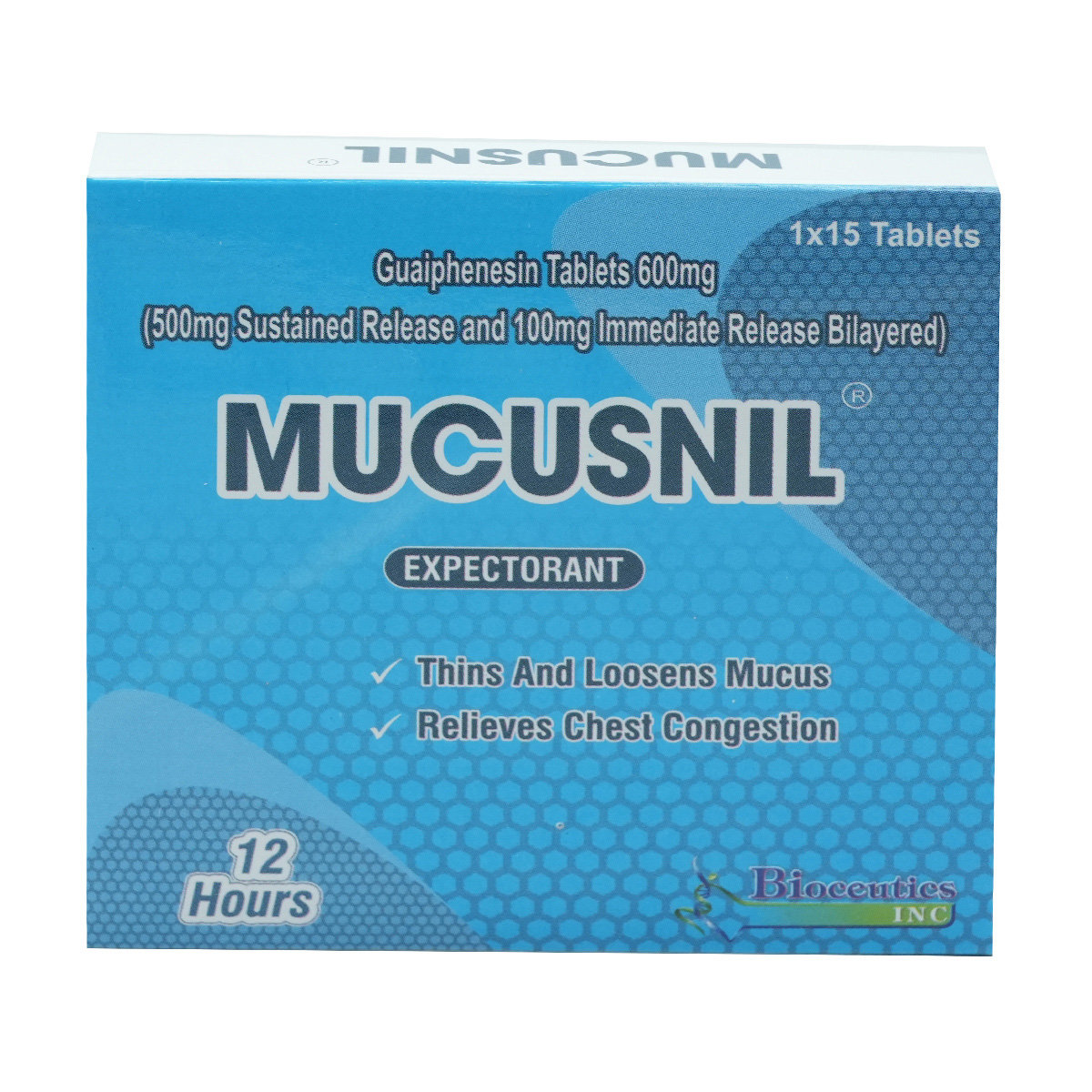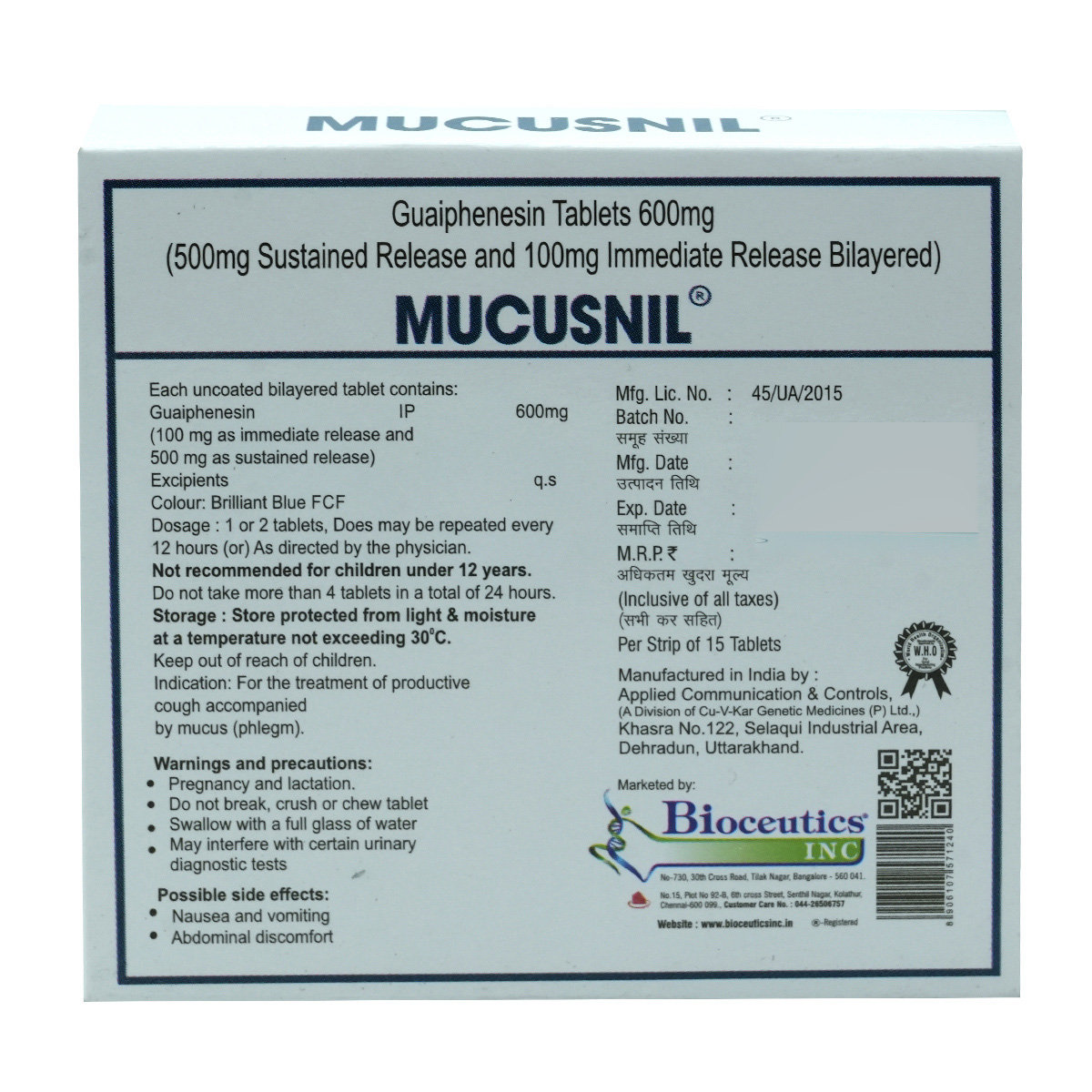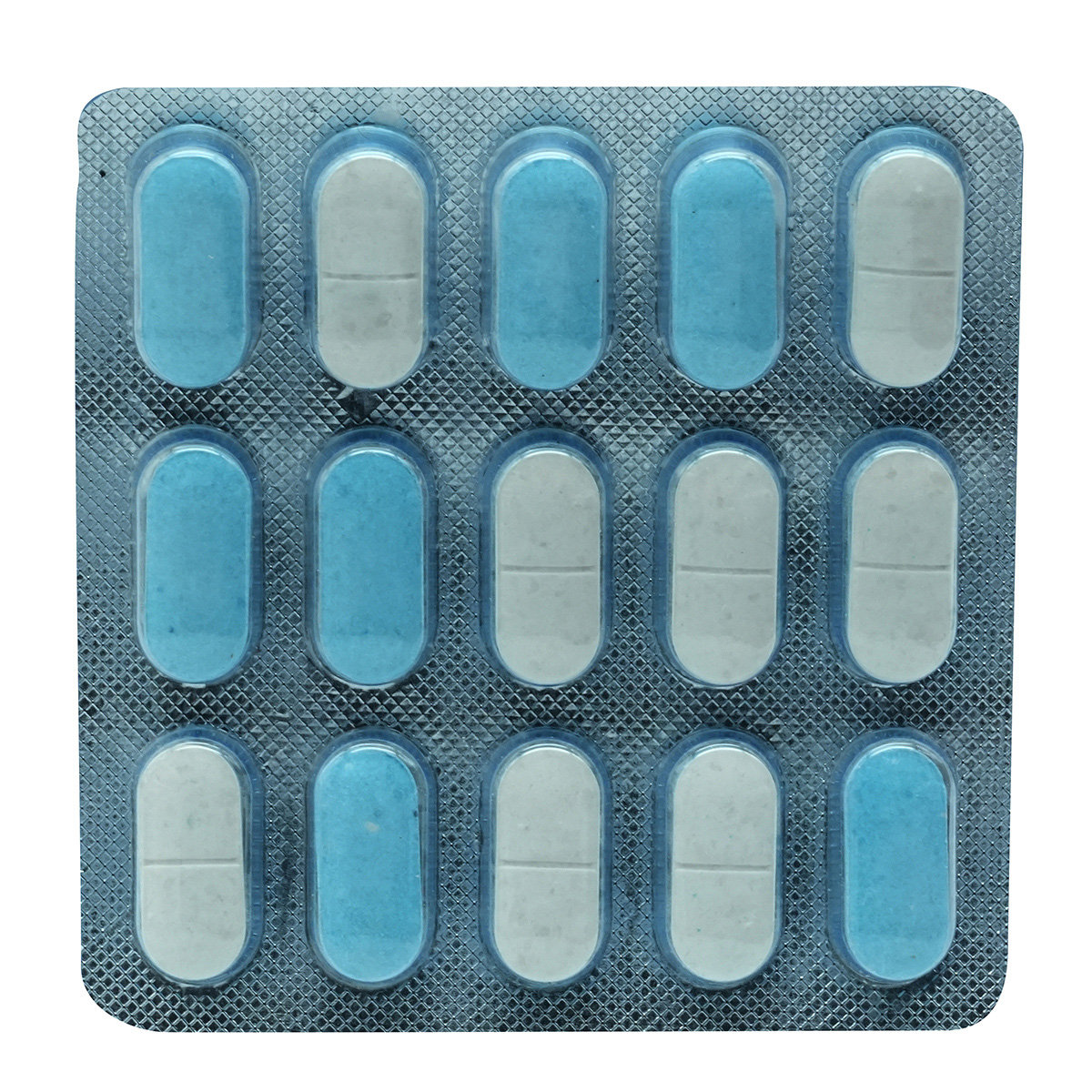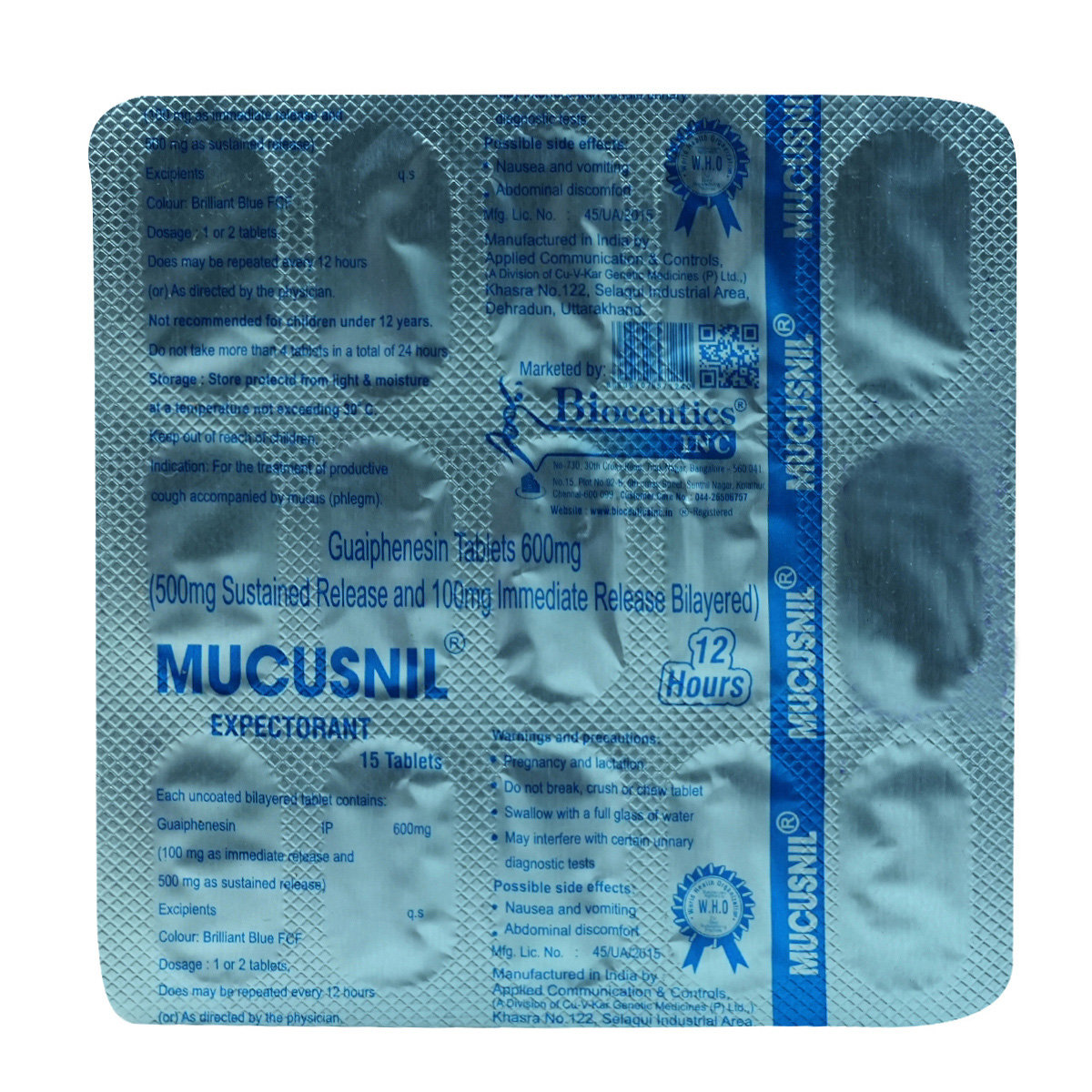Mucusnil Expectorant Tablet 15's
MRP ₹257.5
(Inclusive of all Taxes)
₹38.6 Cashback (15%)
Provide Delivery Location

secured payment

india's most trusted pharmacy

genuine products
Composition :
Manufacturer/Marketer :
Consume Type :
Expires on or after :
Return Policy :
About Mucusnil Expectorant Tablet
Mucusnil Expectorant Tablet belongs to the class of medications called expectorants primarily used to treat a cough with mucus. A sudden expulsion of air through the large breathing passages can help clear them of fluids, irritants, foreign particles, and microbes. There are two types of coughs, namely: dry cough and chesty cough (wet cough). A dry cough is tickly and doesn't produce any vicious or thick mucus, while a chesty cough (wet cough) means mucous or sputum is produced to help clear your airways. Mucusnil Expectorant Tablet is mainly used for the treatment of wet cough.
Mucusnil Expectorant Tablet contains 'Guaifenesin'. Mucusnil Expectorant Tablet works by reducing the thickness of mucus in the air passages, this makes it easier to cough up the mucus and clear the airways.
Take Mucusnil Expectorant Tablet as recommended. Your doctor will recommend how often you take Mucusnil Expectorant Tablet based on your medical condition. Some people may experience nausea, vomiting, stomach pain, diarrhea, itchy rash, and hypersensitivity. Most of these side effects of Mucusnil Expectorant Tablet do not require medical attention and gradually resolve over time. However, if the side effects persist or worsen, please consult your doctor.
If you are allergic to Mucusnil Expectorant Tablet or any other medicines, please tell your doctor. Mucusnil Expectorant Tablet is not recommended for children below 2 years of age, as the safety and effectiveness were not established. If you are pregnant or breastfeeding, it is advised to inform your doctor before using Mucusnil Expectorant Tablet . If you are about to undergo any surgery that requires anaesthesia, please inform your doctor that you are taking Mucusnil Expectorant Tablet . Drink plenty of fluids while taking Mucusnil Expectorant Tablet to loosen mucus. If you have diabetes, asthma, overactive thyroid, porphyria, phenylketonuria (a birth defect that causes accumulation of amino acid, phenylalanine in the body), kidney, liver, or heart problems, inform your doctor before taking Mucusnil Expectorant Tablet .
Uses of Mucusnil Expectorant Tablet

Have a query?
Directions for Use
Key Benefits
Mucusnil Expectorant Tablet contains 'Guaifenesin', which belongs to the class of medications called expectorants primarily used to treat a cough with mucus. Mucusnil Expectorant Tablet works by reducing the thickness of mucus in the air passages, this makes it easier to cough up the mucus and clear the airways.
Storage
- Inform Your Doctor: Notify your doctor immediately about your diarrhoea symptoms. This allows them to adjust your medication or provide guidance on managing side effects.
- Stay Hydrated: Drink plenty of fluids to replace lost water and electrolytes. Choose water, clear broth, and electrolyte-rich drinks. Avoid carbonated or caffeinated beverages to effectively rehydrate your body.
- Follow a Bland Diet: Eat easy-to-digest foods to help firm up your stool and settle your stomach. Try incorporating bananas, rice, applesauce, toast, plain crackers, and boiled vegetables into your diet.
- Avoid Trigger Foods: Steer clear of foods that can worsen diarrhoea, such as spicy, fatty, or greasy foods, high-fibre foods, and dairy products (especially if you're lactose intolerant).
- Practice Good Hygiene: Maintain good hygiene to prevent the spread of infection. To stay healthy, wash your hands frequently, clean and disinfect surfaces regularly, and avoid exchanging personal belongings with others.
- Take Anti-Diarrheal Medications: If your doctor advises, anti-diarrheal medications such as loperamide might help manage diarrhoea symptoms. Always follow your doctor's directions.
- Keep track of your diarrhoea symptoms. If they don't get better or worse or are accompanied by severe stomach pain, blood, or dehydration signs (like extreme thirst or dark urine), seek medical help.
- Inform your doctor about dizziness symptoms. They may adjust your medication regimen or prescribe additional medications to manage symptoms.
- Follow your doctor's instructions for taking medication, and take it at the same time every day to minimize dizziness.
- When standing up, do so slowly and carefully to avoid sudden dizziness.
- Avoid making sudden movements, such as turning or bending quickly, which can exacerbate dizziness.
- Drink plenty of water throughout the day to stay hydrated and help alleviate dizziness symptoms.
- If you're feeling dizzy, sit or lie down and rest until the dizziness passes.
- Track when dizziness occurs and any factors that may trigger it, and share this information with your doctor to help manage symptoms.
- Hydrate your body: Drink enough water to prevent dehydration and headaches.
- Calm Your Mind: Deep breathing and meditation can help you relax and relieve stress.
- Rest and Recharge: Sleep for 7-8 hours to reduce headache triggers.
- Take rest: lie down in a quiet, dark environment.
- Cold or warm compresses can help reduce tension.
- Stay Upright: Maintain good posture to keep symptoms from getting worse.
- To treat headaches naturally, try acupuncture or massage therapy.
- Over-the-counter pain relievers include acetaminophen and ibuprofen.
- Prescription Assistance: Speak with your doctor about more substantial drug alternatives.
- Severe Headaches: Seek emergency medical assistance for sudden, severe headaches.
- Frequent Headaches: If you get reoccurring headaches, consult your doctor.
- Headaches with Symptoms: Seek medical attention if your headaches include fever, disorientation, or weakness.
- Divide daily food intake into smaller, more frequent meals to ease stomach pressure and facilitate digestion.
- Include fibre-rich foods like fruits, vegetables, and whole grains to promote regular bowel movements and support gut health.
- During severe stomach pain episodes, opt for easily digestible foods such as rice, toast, bananas, and applesauce.
- Identify and limit foods that exacerbate symptoms, including spicy, greasy, caffeinated, acidic, and high-sugar foods.
- Drink plenty of water throughout the day to help your digestion.
- Properly chew food to break down particles and reduce stomach strain.
- Participate in moderate exercise, such as walking or swimming, to enhance digestion and alleviate discomfort.
- Avoid excessive alcohol and caffeine consumption, as they might irritate the stomach lining.
- Avoid wearing tight clothing that may put strain on the abdomen.
- Raise your head while sleeping to avoid acid reflux.
Drug Warnings
If you are allergic to Mucusnil Expectorant Tablet or any other medicines, please tell your doctor. Mucusnil Expectorant Tablet is not recommended for children below 2 years of age, as the safety and effectiveness were not established. If you are pregnant or breastfeeding, it is advised to inform your doctor before using Mucusnil Expectorant Tablet . If you are about to undergo any surgery that requires anesthesia, please inform your doctor that you are taking Mucusnil Expectorant Tablet . Drink plenty of fluids while taking Mucusnil Expectorant Tablet to loosen mucus. If you have diabetes, asthma, overactive thyroid, porphyria, phenylketonuria (a birth defect that causes accumulation of amino acid, phenylalanine in the body), kidney, liver, or heart problems, inform your doctor before taking Mucusnil Expectorant Tablet . Mucusnil Expectorant Tablet is not recommended for use in patients taking cough suppressants since they have opposite effects. Coadministration of these medicines may result in severe adverse effects and worsen the patient's condition. Mucusnil Expectorant Tablet may cause dizziness in some patients. It is advised that you do not perform any activities such as driving a vehicle or operating machinery if you experience dizziness during treatment with this medicine. Tell your doctor if you smoke and if you have or have ever had a cough that occurs with a large amount of phlegm (mucus) or if you have or have ever had a breathing problem such as asthma, emphysema, or chronic bronchitis. If you are taking the dissolving granules, tell your doctor if you are on a low magnesium diet or kidney disease.
Drug-Drug Interactions
Drug-Drug Interactions
Login/Sign Up
-
How to manage the interaction:
Co-administration of Mucusnil Expectorant Tablet with Procarbazine can possibly result in an interaction, but it can be taken if your doctor has advised it. Do not discontinue any medications without first consulting your doctor.
Drug-Food Interactions
Drug-Food Interactions
Login/Sign Up
Diet & Lifestyle Advise
- Avoid dairy products such as milk as they may increase mucus production. Also, avoid processed or refined foods to have relief from cough. Instead, replace baked foods, fried foods, white bread, white pasta, French fries, sugary desserts, and chips with green leafy vegetables.
- Drink plenty of fluids to avoid dry throat while you have a cough and loosen mucus.
- Avoid citrus fruits as they may worsen the cough. Eat fruits rich in water content such as pears, watermelon, peaches, and pineapples.
Habit Forming
Therapeutic Class
All Substitutes & Brand Comparisons
RX
Out of StockMucinex 600 mg Tablet 10's
Embiotic Laboratories (P) Ltd
₹169
(₹15.21 per unit)
1% CHEAPER
Alcohol
Safe if prescribed
The interaction of alcohol with Mucusnil Expectorant Tablet is unknown. Please consult a doctor before consuming alcohol with Mucusnil Expectorant Tablet .
Pregnancy
Consult your doctor
The safety of Mucusnil Expectorant Tablet in pregnant women is unknown. Therefore, it is given to pregnant women only if the doctor thinks the benefits outweigh the risks.
Breast Feeding
Consult your doctor
Mucusnil Expectorant Tablet is not recommended for use in breastfeeding women unless necessary. All the risks and benefits should be discussed with the doctor before using this Mucusnil Expectorant Tablet . If the Mucusnil Expectorant Tablet is used, the infant should be monitored closely for any undesired side effects.
Driving
Safe if prescribed
Mucusnil Expectorant Tablet may cause dizziness or drowsiness in some people. Therefore, drive only if you are alert after taking Mucusnil Expectorant Tablet .
Liver
Consult your doctor
Take Mucusnil Expectorant Tablet with caution, especially if you have a history of Liver diseases/conditions. The dose may be adjusted by your doctor as required.
Kidney
Consult your doctor
Take Mucusnil Expectorant Tablet with caution, especially if you have a history of Kidney diseases/conditions. The dose may be adjusted by your doctor as required.
Children
Safe if prescribed
Mucusnil Expectorant Tablet is not recommended for children below 2 years of age. However, please consult a doctor before using Mucusnil Expectorant Tablet in children.
FAQs
Mucusnil Expectorant Tablet contains Guaifenesin. Mucusnil Expectorant Tablet works by reducing the thickness of mucus in the air passages, this makes it easier to cough up the mucus and clear the airways.
Common side effects of Mucusnil Expectorant Tablet include nausea, vomiting, stomach pain, diarrhea, itchy rash, hypersensitivity. Most of these side effects of Mucusnil Expectorant Tablet do not require medical attention and gradually resolve over time. However, if the side effects persist or worsen, please consult your doctor.
Yes, Mucusnil Expectorant Tablet may cause drowsiness or dizziness. It is not necessary for everyone taking Mucusnil Expectorant Tablet to experience this side effect. However, avoid driving or doing any hazardous tasks if you feel drowsy or dizzy after taking Mucusnil Expectorant Tablet .
You are recommended to take Mucusnil Expectorant Tablet for as long as your doctor has recommended it. However, if the symptoms persist or worsen with rash, fever, or persistent headache after one week of using Mucusnil Expectorant Tablet , please consult your doctor.
Mucusnil Expectorant Tablet is not recommended for use in patients taking dextromethorphan (cough suppressant) since they have opposite effects. Coadministration of these medicines may result in severe adverse effects and worsen the patient's condition.
Country of origin
Manufacturer/Marketer address
Disclaimer
Author Details
We provide you with authentic, trustworthy and relevant information
Reference
- https://www.drugs.com/guaifenesin.html
- https://medlineplus.gov/druginfo/meds/a682494.html#precautions
- https://www.rxlist.com/consumer_guaifenesin_mucinex/drugs-condition.htm
- https://www.mims.com/india/drug/info/guaifenesin?type=full&mtype=generic#special-precautions
- https://www.drugsupdate.com/generic/view/992/Guaifenesin











